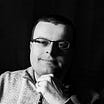J.K.
JK’s optimism, intellectual rigor, and vision are exceptional. I would’ve missed a whole lot of what’s possible if I hadn’t met him. Let’s dive right into our conversation.
Tell us about yourself and what's on top of your mind right now.
I am a political science major who now works in the finance industry. I begin every day largely the same way, waking up at about 4 am, before the hustle and bustle, to try and read and write as much as possible.
Top of mind is always 1) How can I be as productive as possible during the day 2) How can I best contribute to the mission of Risk & Progress.
How do you feel at this moment in life?
At this moment, I think my feelings are best described as “anxious” despite having little to actually worry about. Every day feels, unfortunately, like a race against the clock. I imagine that I am not alone in this regard, and probably many feel this way.
What is the biggest lesson you’ve learned from your parents?
Probably discipline at work and prudence with money. My wife and I are natural savers, putting in tremendous amounts of time and effort at work, earning a “surplus,” and trying to maximize how that “surplus” works for us down the road. Capital gains are magic.
What have you experienced that has changed the way you live?
I lived abroad for several years. This was intentional, I wanted to plunge myself into a foreign culture and language. I believe everyone should do this if they have the means. Living abroad, no matter where that might be, sharpens the senses and illustrates that the illusions and preconceptions that one may have had about these lands (and their own) are not so pure and simple.
How do you define happiness?
I guess I don’t. I strive for something more akin to Eudaimonia, the Stoic concept of contentment. Happiness is too fleeting. One cannot feel happy all of the time, so it’s not a goal worth shooting for, in my opinion.
Who is your favorite writer, and why?
I don’t really have one. I enjoy the writing style of Hemingway, but I rarely read fiction material. I am more interested in what is written and the information density of the work, rather than how well it is written. If the prose is too “flowery” I put the book down.
Imagine this writer was standing right in front of you and you can ask one question, what would you ask?
Using the above example of Hemingway, I would ask how he approaches sentence consolidation and simplification. The key to great writing is saying a lot with very few works. This is very hard to do and Hemingway was a master.
Daniel Kahneman once said, “If you were allowed one wish for your child, seriously consider wishing him or her optimism.” With JK’s work, I can do more. I started using his curriculum on human progress to guide me in sharing these lessons with my children.
Up next, Becky.
See you next week.






